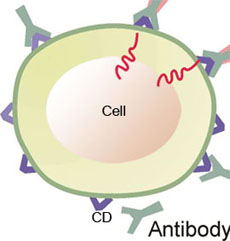CD Markers

The cluster of differentiation (often abbreviated as CD) is a protocol used for the identification and investigation of cell surface molecules, especially for leukocytes. When lymphocytes mature, they express different protein receptors on the cell surface, and the protein receptors are useful in determining the type and maturation stage of the cells being examined. And these cell surface molecules can provide targets for immunophenotyping of cells. So they are important for organism immune reactions.
Though only a fraction of CD molecules are better-known well, CD molecules can act in various ways, typically acting as receptors or ligands important to the cell. Thus CD molecules are very helpful in determining leukocytes. Within the example of CD4 and CD8, these molecules are essential in antigen recognition. Others(e.g., CD135) act as cell surface receptors for growth factors. Whereas they are not merely markers on the cell surface. CD proteins have lots of other functions, such as cell adhesion.
BiologicsCorp produces a lot of CD marker antibodies which can recognize particular CD molecules. The CD molecules are commonly used as cell markers in immunophenotyping, they require recognition by the CD marker antibodies. Here are various kinds of CD marker antibodies for you to choose.

